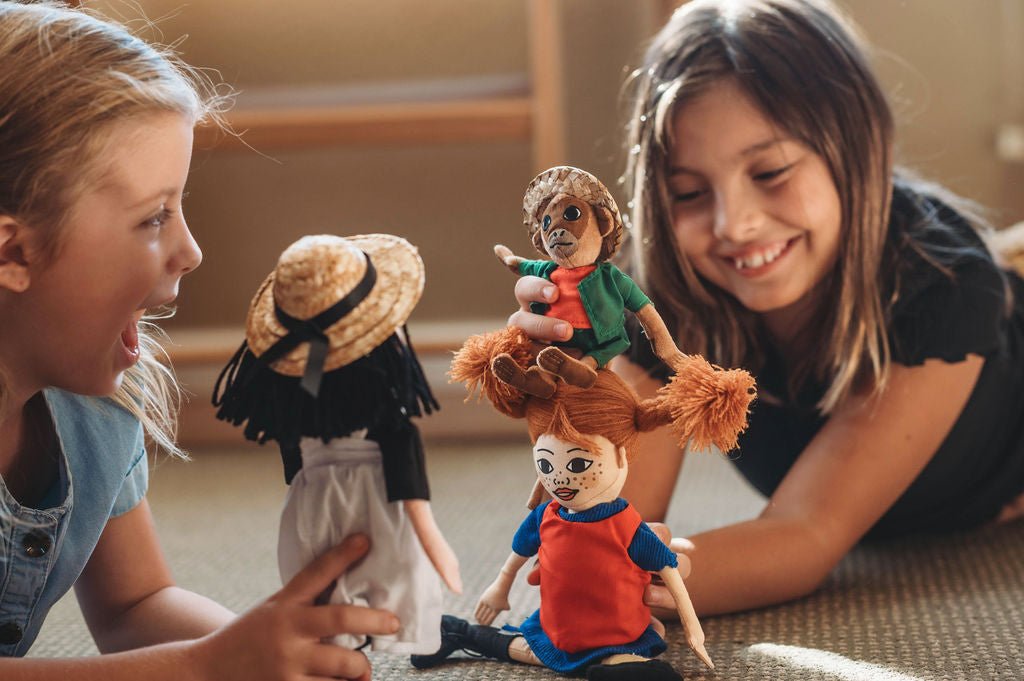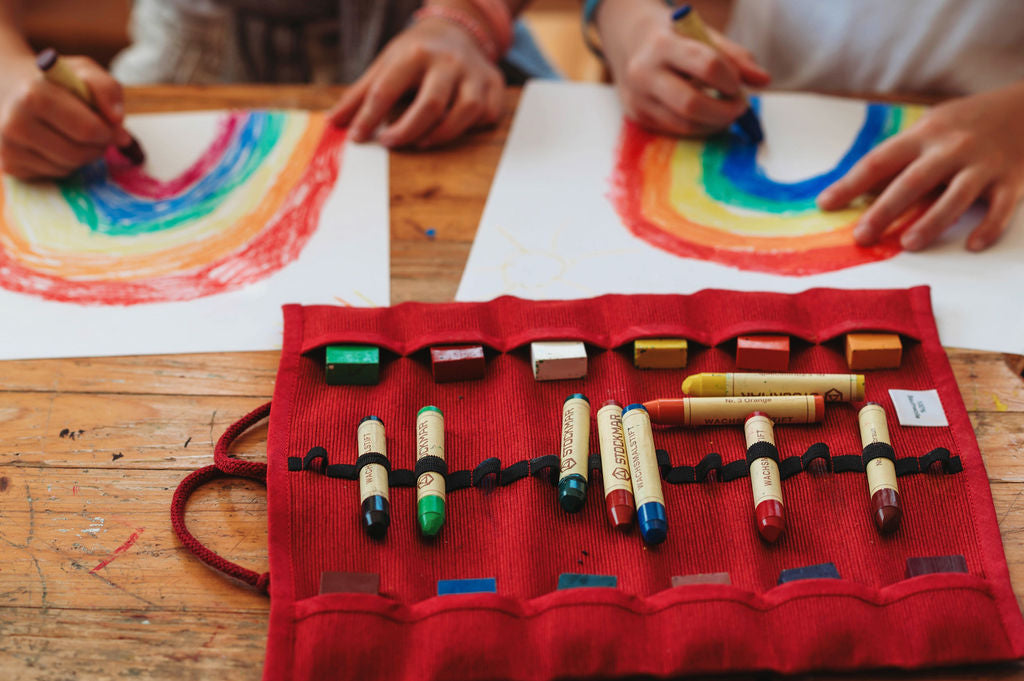
“When children pretend, they’re using their imaginations to move beyond the bounds of reality. A stick can be a magic wand. A sock can be a puppet. A small child can be a superhero.” ~ Fred Rogers
Peek-a-boo! I see you!
We’ve all played it, whether as a child or as an adult with a child. It is one of the first “pretend play” games we play as humans. This reflects the fact that pretend play, an activity as natural to children as breathing, holds immense power in shaping young minds.
I still remember playing with my cars, creating worlds and action and plots. I also remember interacting and negotiating with my sister in our play store, or learning about what to expect in Kindergarten when we played school.
Pretend play is more than just a simple game; it's a vital component of child development, weaving together imagination, social skills, and cognitive growth.
It is vital that children are given space to find their imagination in solo play, while also learning about socialization and narratives while playing with other children and adults.
The Essence of Pretend Play
Pretend play, often characterized by role-playing, make-believe scenarios, and imaginative playthings, is not just a fun activity but a critical learning tool. It provides a unique lens through which children view and understand the world around them. This form of play is a child's way of interpreting life experiences, emotions, and relationships, allowing them to navigate the complexities of the world in a safe and controlled environment.
Pretend play cultivates crucial cognitive abilities in children, laying the foundation for creative thinking and problem-solving. Maria Montessori, pioneer of the Montessori method, has stressed the role of play in nourishing children's natural curiosity and intelligence. When children engage in pretend play, they are driven by their curiosity to understand their world. This fuels their endeavor to imagine new worlds full of complex characters and storylines. Constructing these pretend worlds involves high levels of conceptual thinking and cognitive processing. As they navigate intricate pretend scenarios, children utilize skills like symbolic representation, deductive reasoning, and problem analysis.
Leading experts in early childhood development agree that pretend play powerfully cultivates children's budding cognitive abilities. By eliciting imaginative thinking, curiosity, and problem-solving, pretend play provides the scaffolding for expanded creative thinking and intellectual growth. As children pretend, they are honing the cognitive tools essential for academic and life success. Pretend play offers an unparalleled pathway to building children's cognitive capacities.
Cognitive Development
At the heart of pretend play lies the development of cognitive skills, laying the foundation for creative thinking and problem-solving. As Rudolph Steiner, the founder of Waldorf education, emphasized, imaginative play is essential for developing capacities for creativity and independent thought. Through pretend scenarios, rich plots, and inventive characters, children can stretch their thinking in new directions. This builds their ability to conceive innovative ideas and solutions, which Steiner saw as fundamental to intellectual growth.
Equally, Maria Montessori, pioneer of the Montessori method, stressed the role of play in nourishing children's natural curiosity and intelligence. When children engage in pretend play, they are driven by their curiosity to understand their world. This fuels their endeavor to imagine new worlds full of complex characters and storylines. Constructing these pretend worlds involves high levels of conceptual thinking and cognitive processing. As they navigate intricate pretend scenarios, children utilize skills like symbolic representation, deductive reasoning, and problem analysis.
Leading experts in early childhood development concur that pretend play powerfully cultivates children's budding cognitive abilities. By eliciting imaginative thinking, curiosity, and problem-solving, pretend play provides the scaffolding for expanded creative thinking and intellectual growth. As children pretend, they are honing the cognitive tools essential for academic and life success. Pretend play offers an unparalleled pathway to building children's cognitive capacities.
Social and Emotional Growth
Beyond cognitive growth, pretend play crucially nurtures children's social and emotional capacities. As children negotiate pretend scenarios, they learn invaluable skills like cooperation, sharing, and communication. By taking on different roles, they are exposed to diverse perspectives, helping build empathy and understanding. As Fred Rogers noted, through pretend play children gain "practice in flexing their imagination and are encouraged to consider other people's feelings."
Pretend play offers a secure space for children to explore and express emotions. As they act out imaginary situations, they can safely work through anxieties, fears, and stressors from the real world. Taking on various roles allows them to try on different personalities and ways of being, developing self-awareness and emotional intelligence. Child development experts emphasize that this freedom for emotional expression is integral in pretend play.
As Dr. Stuart Brown explained, pretend play provides "an arena in which children are liberated to explore the entire landscape of human emotions."
Ultimately, pretend play enables monumental social and emotional learning. By collaborating, empathizing, and expressing themselves imaginatively, children build their capacity for positive relationships. They gain resilience, self-esteem, and essential skills for understanding themselves and connecting with others.
The social and emotional lessons of pretend play form an integral part of early development.
Language and Communication Skills
Pretend play offers a meaningful context for children to advance their language and communication abilities. When engaged in imaginative scenarios, children are motivated to interact and share ideas. They practice using vocabulary, grammar, and abstract language to describe intricate pretend storylines. As psychology professor Sandra W. Russ explained, pretend play "provides children with a significantly broader vocabulary because of their constant need to describe action and interaction."
Through negotiating roles and plots, children gain experience with complex communication. They learn to listen attentively, take conversational turns, and respond appropriately to others' statements. Experts emphasize that pretend play teaches children to organize information and articulate it coherently. The meaningful nature of pretend play makes it the ideal setting for improving verbal expression, narrative comprehension, and interactive language skills.
Overall, pretend play accelerates language and communication development in immeasurable ways. The imaginative, collaborative context inspires children's blossoming verbal abilities. Children feel immersed in a world where they have important ideas to share. This motivation is the spark that helps vocabulary acquisition, eloquent expression, and conversational finesse flourish. As children pretend together, they gain communication know-how that forms a vital foundation for social and academic endeavors.
Steiner and Montessori on Pretend Play
Both Rudolph Steiner and Maria Montessori recognized the importance of pretend play, albeit with different approaches. Steiner's philosophy encourages imaginative play as a means to develop a well-rounded individual, focusing on creativity and holistic growth. Montessori, on the other hand, placed a higher emphasis on reality-based play but acknowledged the role of imagination in helping children make sense of the world.
Encouraging Pretend Play
As parents and educators, fostering an environment conducive to pretend play is key. This includes:
-
Providing Open-Ended Playthings: Objects that are not fixed in their function encourage imagination. Simple items like blocks, fabric, and natural materials can become anything in a child's mind.
-
Creating a Safe Play Space: A dedicated area where children can freely engage in pretend play without interruptions or excessive rules.
-
Being a Willing Participant: Occasionally joining in their play, not to direct but to be a part of their imaginative world, validates their creativity.
- Observing and Listening: Pay attention to the themes and ideas in their play. This can provide insights into their thoughts and feelings.
Conclusion
Pretend play is a magical realm where children learn, grow, and express themselves. It's a vital part of childhood, shaping their cognitive, social, and emotional well-being. As Rudolph Steiner and Maria Montessori highlighted, nurturing this aspect of play can have lasting positive effects on a child's development.
Let's cherish and encourage these moments of unbridled imagination, understanding that in each pretend scenario, a child is not just playing but learning about the world and themselves.
In the words of Maria Montessori, "Play is the work of the child." Let's honor this work and watch as our children blossom into creative, thoughtful, and empathetic individuals.
Frequently Asked Questions (FAQs)
1. What age is most suitable for pretend play?
Pretend play typically begins to develop around the age of 18 months and continues to evolve through early childhood. However, children of different ages engage in pretend play differently. Toddlers might start with simple make-believe activities, while older children can create more complex scenarios.
2. How can I encourage my child to engage in pretend play?
You can encourage pretend play by providing a variety of open-ended toys, such as blocks, dolls, or dress-up clothes, that stimulate imagination. Also, creating a safe and welcoming play space and sometimes participating in their play without directing it can significantly encourage pretend play.
3. Is it normal for a child to prefer playing alone rather than with others?
Yes, it's perfectly normal. Some children may enjoy solitary pretend play as it allows them full control over the play narrative. However, playing with others is also important for social development. It's beneficial to encourage a balance of both solitary and group play.
4. Can pretend play aid in academic learning?
Absolutely. Pretend play can enhance cognitive skills like problem-solving and creativity, which are vital in academic learning. It also helps in language development and can improve concentration and attention, all of which contribute positively to academic performance.
5. Should I be concerned if my child's pretend play seems overly fantastical or unrealistic?
Not at all. One of the beauties of pretend play is that it allows children to explore and experiment with the boundaries of reality. This kind of imaginative play is healthy and helps in developing creativity and abstract thinking skills. As long as the play is safe and the child is otherwise well-adjusted, there's no need for concern.













